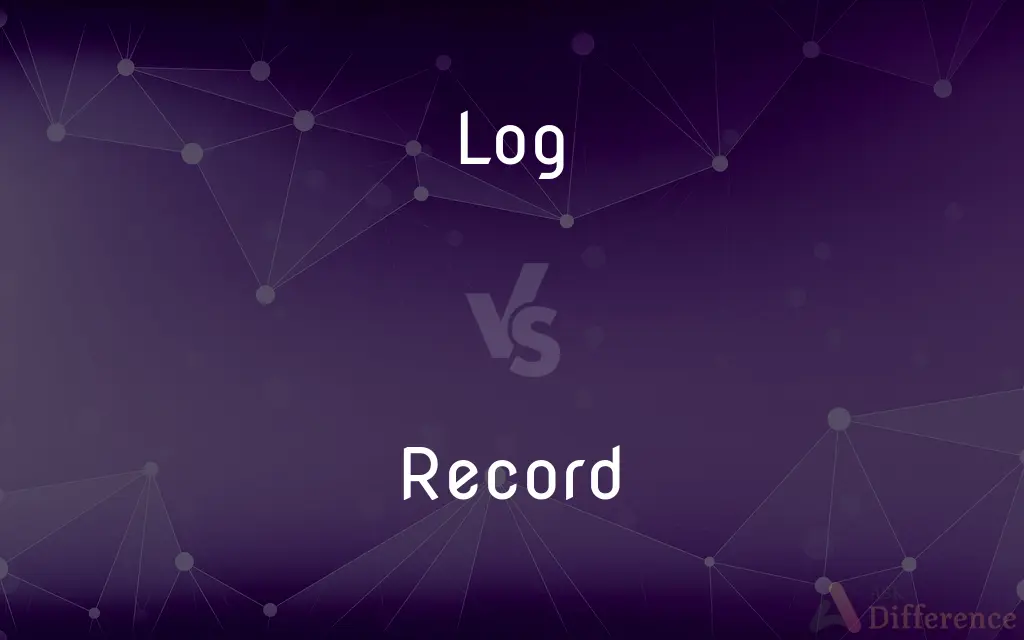Log vs. Record — What's the Difference?
By Fiza Rafique & Urooj Arif — Updated on March 5, 2024
A log is a sequential record of events or processes, often chronological and used for monitoring. A record is a broader term for documented information, stored for reference, evidence, or historical purposes.

Difference Between Log and Record
Table of Contents
ADVERTISEMENT
Key Differences
A log specifically refers to the detailed and chronological documentation of events, activities, or processes, primarily used to track occurrences or monitor systems over time. On the other hand, a record encompasses any form of documented information or data that is preserved for reference, evidence, historical purposes, or legal requirements, without necessarily being in chronological order.
While logs are typically utilized in contexts such as computing (e.g., system logs), navigation, and project management to provide a time-based trace of activities, records can range from personal documents (birth certificates, academic transcripts) to official archives (meeting minutes, legal contracts), highlighting their broader applicability. Logs serve as a tool for analysis, troubleshooting, and decision-making by providing a time-stamped sequence of events, whereas records are kept to establish facts, serve as proof, or inform future actions without the emphasis on sequential order.
The nature of logs as sequential makes them particularly valuable for understanding the progression of events or diagnosing problems in technical environments. Conversely, records, with their diverse forms and purposes, play a crucial role in governance, personal identity, organizational memory, and legal evidence, underscoring their foundational importance across various domains.
Logs often require regular review and management to ensure their relevance and effectiveness in ongoing monitoring tasks, with older logs being archived or deleted over time. In contrast, records may be preserved for indefinite periods, subject to retention policies and regulatory requirements, reflecting their enduring value and utility.
Logs are frequently designed for use by specialists or professionals who interpret them within specific contexts, such as IT administrators analyzing system logs. Records, however, are accessed and utilized by a wide range of stakeholders, from individuals seeking personal documents to officials enforcing policies or laws, indicating their widespread relevance and accessibility.
ADVERTISEMENT
Comparison Chart
Definition
Chronological record of specific events or processes.
Documented information preserved for reference or evidence.
Primary Use
Monitoring and tracking over time.
Reference, evidence, or historical purposes.
Sequential Nature
Typically chronological.
Not necessarily chronological.
Contexts
Computing, navigation, project management.
Legal, personal, organizational, historical.
Importance
For analysis, troubleshooting.
For establishing facts, legal proof.
Review and Management
Requires regular review and archiving.
Preserved indefinitely, subject to retention policies.
Accessibility
Specialists or professionals.
Wide range of stakeholders.
Compare with Definitions
Log
A chronological record of events.
The captain kept a detailed log of the voyage.
Record
An item of historical importance.
The artifact is a record of ancient civilization.
Log
An environmental record, like a dive log.
His dive log included every underwater expedition.
Record
Data stored for future reference.
The research data was compiled into a comprehensive record.
Log
A record of operational processes.
The log showed consistent maintenance checks.
Record
Official documentation of transactions.
The company maintains a record of all financial dealings.
Log
A system's activity documentation.
The IT department reviews the server log daily.
Record
A document containing evidence or information.
The meeting's minutes were kept as an official record.
Log
A journal for tracking progress.
She maintains a log of her fitness routine.
Record
A personal document, like a birth certificate.
Her birth record was required for the application.
Log
A part of the trunk or a large branch of a tree that has fallen or been cut off
A roaring log fire
She tripped over a fallen log
Record
To set down for preservation in writing or other permanent form
She recorded her thoughts in a diary.
Log
An official record of events during the voyage of a ship or aircraft
A ship's log
Record
To register or indicate
The clerk recorded the votes.
Log
An apparatus for determining the speed of a ship, originally one consisting of a float attached to a knotted line that is wound on a reel, the distance run out in a certain time being used as an estimate of the vessel's speed.
Record
To record the words, sound, appearance, or performance of (someone or something)
Recorded the oldest townspeople on tape.
Recorded the violin concerto.
Log
A logbook, or journal of a vessel's (or aircraft's) progress.
Record
An account, as of information or facts, set down especially in writing as a means of preserving knowledge.
Log
Large log at the back of a hearth fire
Record
Information or data on a particular subject collected and preserved
The coldest day on record.
Log
Enter into a log, as on ships and planes
Record
A writing by which some act or event, or a number of acts or events, is recorded; a register; as, a record of the acts of the Hebrew kings; a record of the variations of temperature during a certain time; a family record.
Record
The sum of recognized accomplishments;
The lawyer has a good record
The track record shows that he will be a good president
Record
Make a record of; set down in permanent form
Common Curiosities
What is a record?
A record is documented information preserved for reference, evidence, or historical purposes.
Why are logs important in computing?
Logs are crucial for analyzing system behavior, troubleshooting issues, and ensuring operational integrity.
What role do records play in governance?
Records support governance by providing evidence of decisions, actions, and transactions, ensuring accountability and transparency.
What makes a document a legal record?
Legal records contain information or evidence that is recognized by law, such as contracts or official correspondences.
Can anyone access a log?
Access to logs is usually restricted to professionals or specialists who can interpret the data, such as IT administrators.
What is a log?
A log is a detailed, chronological documentation of events or processes, used for monitoring.
How do logs and records differ in their use?
Logs are used for monitoring and tracking over time, while records serve as evidence, reference, or for historical purposes.
How do logs help in project management?
Logs help in project management by tracking progress, identifying issues early, and ensuring accountability through documentation.
Why is record management important?
Effective record management ensures information is preserved accurately, accessible when needed, and compliant with legal requirements.
What is the significance of records in research?
Records in research provide a basis for analysis, support findings, and ensure that data can be reviewed or replicated.
Can a log be considered a record?
Yes, a log can be considered a type of record, specifically focusing on chronological documentation.
How long are logs typically kept?
The retention period for logs varies based on operational needs and regulatory requirements but is generally shorter than for other records.
What is a historical record?
A historical record documents events, people, or places of the past, serving as evidence or information for future generations.
What differentiates a public record from a private one?
Public records are accessible by the general public and relate to governmental or public activities, while private records are controlled by individuals or organizations and have restricted access.
How do records support personal identity?
Personal records, like birth certificates or ID documents, legally verify an individual's identity and are essential for various civic functions.
Share Your Discovery

Previous Comparison
Pocky vs. Rocky
Next Comparison
Genre vs. SwingAuthor Spotlight
Written by
Fiza RafiqueFiza Rafique is a skilled content writer at AskDifference.com, where she meticulously refines and enhances written pieces. Drawing from her vast editorial expertise, Fiza ensures clarity, accuracy, and precision in every article. Passionate about language, she continually seeks to elevate the quality of content for readers worldwide.
Co-written by
Urooj ArifUrooj is a skilled content writer at Ask Difference, known for her exceptional ability to simplify complex topics into engaging and informative content. With a passion for research and a flair for clear, concise writing, she consistently delivers articles that resonate with our diverse audience.














































